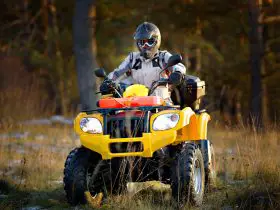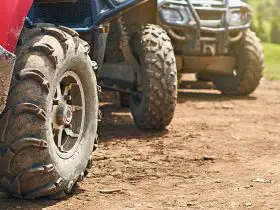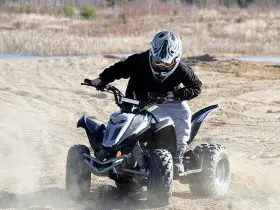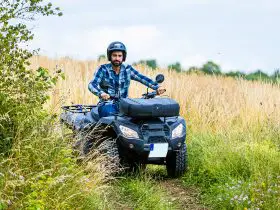Have you recently purchased your first ATV? If so, there are a few ATV laws and regulations you’ll need to be aware of before you rev that engine. ATV helmet laws are the most important, as safety should be your top priority when operating any type of off-road vehicle.
In many cases, wearing a helmet while riding an ATV may not be required by law. Laws vary by state, age, and the type of property one is riding on. However, common sense says that you should always wear a helmet on your ATV, even if it’s not technically required.
Whether you are moving supplies from one part of the farm to the other or exploring your local trail systems, wearing ATV helmets should be a priority for all riders.
Still, it helps to know exactly when a helmet is required. Keep reading to learn all about state helmet laws.
Table of Contents
Type of Helmet Needed for ATVs
Before getting into the specifics of state-by-state helmet laws, you need to know what helmets for ATVs are required for operation. No matter how old you are or where you live, there’s going to be a time when you need an ATV helmet.
So what helmets are acceptable and safe for use on an ATV? In most states, this requires the helmet to meet U.S. Department of Transportation standards. Helmets that meet this requirement will have a DOT sticker on the outside, rear of the helmet.
These are the same type of helmets required by motorcycle users. They are full-face helmets that protect the entire head, and ideally, have a visor for eye protection. If they don’t you’ll want to wear goggles when operating your ATV.
DOT certified helmets will have thick inner padding, a chin strap, and will weigh more than standard helmets, usually around three pounds. They also can’t have anything protruding from the surface of the helmet, like spikes, common on kids’ bicycle helmets.
ATV Helmet Laws
So you know what type of helmet you are going to need. But when will you actually need to wear one? Again, it depends on four main factors;
- The state you are riding in
- Whether you are on public or private property
- The age of the rider
- Single rider or carrying a passenger
The specifics of helmet laws will vary by state. You’ll need to check your state’s vehicle or recreation websites, but here are a few state examples of helmet laws.
Indiana ATV Helmet Laws
In the state of Indiana, all riders under the age of 18 are required to wear a helmet at all times. This includes riding on both public and private land, including your own.
Additionally, those who own the ATV can be fined for allowing young riders to operate an ATV without a helmet, even on their own land. The exception to this is when the rider is performing farm-related duties on farmland.
Riders or passengers 18 years of age and older are not required to wear helmets on an ATV.
Michigan ATV Helmet Laws
In the state of Michigan, just north of Indiana, DOT certified helmets are required by all ATV operators and passengers, on both private and public land. A few exceptions are in place, including operating an ATV on a state-licensed hunting tract, driving under 10 mph.
Texas ATV Helmet Laws
In the Lone Star State, helmets are required for all ATV operators and passengers when on public land. When operating your ATV on private land, helmets are not required.
Other ATV Laws to Understand
Helmet laws aren’t the only important laws to understand before you start whizzing around on private or public land.
For example, some states require you to register your OHV. Some states only require you to register your ATV if you plan to use it on public land. And still, other states don’t require registration at all.
One of the biggest differences between states is when youth are allowed to operate an ATV. Normally, children as young as 10, or even younger, can operate an ATV under the direct supervision of an adult.
In certain states, an age limit of 14, 16, or 18 is required before a youth can operate independently. And some states will require youth and/or adults to obtain an operator’s license or a safety certificate.
Also, be aware of passenger laws. In some states, you can carry a passenger on any ATV. In many others, passengers are only allowed on ATVs where the manufacturer explicitly lists ATV passenger capabilities.
And lastly, understand on-road use. In most areas, you can’t ride an ATV on public roads, though sometimes you can cross over them.
It’s up to you to look up your state’s specific ATV laws, which are normally listed on your state’s agricultural, natural resources, or recreation management website.
Do you hope to plan an out-of-state off-road vacation? It’s your responsibility to also learn the laws of any states you plan to travel to and use your ATV.
Practice Safe ATV Driving
While helmets are the single most important piece of gear you can wear while riding, it’s your driving habits that will be responsible for preventing ATV accidents in the first place.
That’s why it’s beneficial for all new riders, either youth or adults, to take an ATV safety course. You will learn the fundamentals of safe driving, as well as how to properly use your vehicle.
One of the most important things to remember is to never operate an ATV on public roads. The reason this is illegal in most areas is that it’s very dangerous. In fact, 32% of all ATV fatalities take place on paved surfaces.
And along with a helmet, you should always wear thick, loose-fitting clothing, or ATV-specific gear. Wear gloves to protect your hands, and wear boots that cover your ankles. Always dress like you are going to fall off your ATV.
Ride Safe, Ride Often
As you can see, ATV helmet laws, and other regulations regarding ATV safety, can differ quite a bit from state to state. Be sure to look up your state’s most recent laws regarding ATV use, so that you can drive safely with confidence.
But even though helmets are not always required, they are always necessary for safe driving. Don’t risk your life. Instead, ride safely so you can ride often.
Still, trying to decide if an ATV is right for you? Make sure you consider UTVs, which can do everything an ATV can, along with carrying more gear and passengers. Read the full comparison of these two vehicles here.










